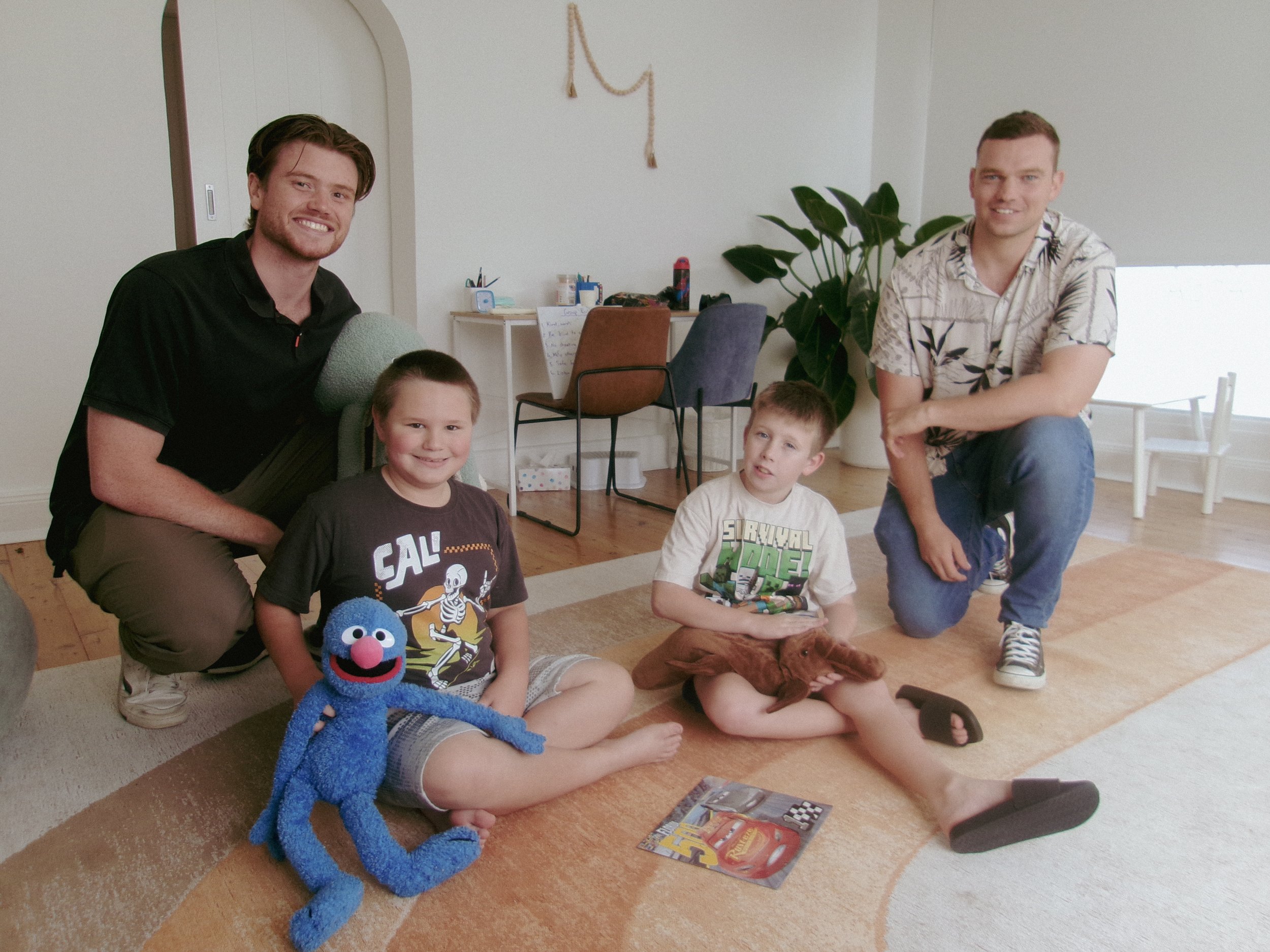
OCCUPATIONAL THERAPY
Assisting individuals across the lifespan to focus on overcoming barriers that prevent them from engaging in activities that are important to them.
EMBRACE THE COLOURS OF CHANGE •
EMBRACE THE COLOURS OF CHANGE •
TRANSFORMING CHALLENGES INTO ACHIEVEMENTS.
Occupational Therapists use a blend of strategies, adaptive tools, and environmental modifications to support people in leading better, more meaningful lives.
Who we support
THERAPY FOR ALL AGES & STAGES
We take pride in tailoring our approach to meet the unique needs of every individual, whether they come to us or we visit them. Our goal is to provide the tools and resources that empower them to thrive at every stage of life.
Select a life stage to explore how we supported an individual
Our Services
HOW WE CAN HELP
We specialise in supporting people of all abilities through a collaborative approach that integrates our psychology services and occupational therapy.
We offer four core services, each tailored to meet the unique needs of our diverse clientele.
OCCUPATIONAL THERAPY INTERVENTION
Delivered on a consistent basis - either weekly, fortnightly, or monthly.
NDIS FUNCTIONAL CAPACITY ASSESSMENTS
Comprehensive assessments to help you access the NDIS services you need.
COMFORT AND CONVENIENCE WITH TELEHEALTH
Convenient access to our services from anywhere in Australia.
HOME & SCHOOL COLLABORATIVE VISITS
Communication is key in the school setting, and we pride ourselves on this collaborative approach.
CASE STUDY 1
RECOGNISING THE CHALLENGES OUR LITTLE ONES FACE.
Oscar, a 4-year-old boy who loved superheroes and fast cars. Oscar demonstrated difficulty with attending to tasks at the table and was always on the move. Oscar’s parents were worried about whether he would be ready for school the following year.
Oscar also presented with an aversion to noise, becoming overwhelmed at preschool when others were too loud during indoor activities. Sometimes this would make Oscar outwardly frustrated towards his peers.
Play-Based intervention
The Occupational Therapist focused on play-based interventions with Oscar, naturally capturing his attention and making therapy enjoyable. Through superhero-themed games, the OT supported development of:
Attention skills
Fine motor development
Social interaction
Emotional regulation
Problem solving skills
Sensory Diet Implementation
A sensory diet was crucial in addressing Oscar’s sensory processing challenges. The OT incorporated:
Heavy work activities: pushing toy cards filled with weights
Proprioceptive input: ‘superhero training’ exercises and obstacle courses
Calming strategies: noise-cancelling headphones during loud activities, and designated quiet space at home and preschool.
Grading Tabletop Tasks
Oscar was gradually introduced to tabletop activities through aligning with Oscar’s interest and providing him a ‘just right’ challenge for his skill level:
Cutting and pasting superhero scenes together.
Drawing cars to improve fine motor skills.
Creating comic strips to practice sequencing.
Oscar’s love for superheroes and cars became a powerful tool in his therapy, leading to significant improvements in his self-regulation skills, fine motor skills, and social interactions with peers. This multi-faceted approach to therapy gave both Oscar and his parents the confidence to transition to school successfully.
Compensatory Strategies
The OT assisted Gemini to find ways to engage within her previously enjoyed activity through energy conservation techniques and environmental modifications.
Remedial Strategies
The OT provided education and guidance on how to incorporate pain management techniques and strengthening exercises to reframe negative thought pattern and engage in suitable exercises.
CASE STUDY 3
WE ARE HERE FOR YOU. WHATEVER YOUR AGE.
Mariane, a 42 year old women experiencing acute stress and depression was referred for Occupational Therapy support to assist with increasing her independence and engagement within household tasks. The Occupational Therapist (OT), used both compensatory and remedial strategies to increase her motivation and independence within this goal.
Compensatory Strategies
The OT assisted Mariane to determine an optimal routine to ensure that she was completing self-care tasks to a hygienic and consistent standard. This was achieved through visual prompts, task modification and reminders to complete tasks.
Remedial Strategies
The OT assisted Mariane to identify and implement adaptive coping strategies to manage her ruminating thoughts. Further implementation was used to enable Mariane to increase her independence with time management and organisation to reduce her overall stress and improve productivity.
Our Assessments
GIVING YOU A CLEARER INSIGHT INTO THE FUTURE.
Our OT’s work with you to understand your unique strengths and challenges through a range of comprehensive assessments.
-
Specialist Disability Accommodation (SDA) refers to housing specifically designed for individuals with high support needs, that require specialised support features (i.e., level entry access, wider doorways, ceiling hoist).
This is a comprehensive assessment to evaluate and consider what accommodation will be suitable based on the individual's permanent disability and support needs. This assessment will take into account the individual's current and predicted future functional status (mobility, self-care requirements, etc) to determine which design category (improved liveability, robust, fully accessible or high physical support) will be most suitable to enable them to have as much autonomy as possible while considering reasonable and necessary.
-
Supported Independent Living (SIL) provides support for individuals living with a disability to live in a shared or independent setting, assisting with daily activities (cooking, showering, household tasks etc).
This is a comprehensive assessment to evaluate an individual's informal and formal support needs to complete activities of daily living (ADLs) and instrumental activities of daily living (IADLs). To be eligible for SIL, an individual requires at least 8 hours of active support per day and indirect support for all hours outside of the active support to complete ADLs and IADLs.
-
Independent Living Options (ILO) offers flexible support services designed to help individuals living with a disability to live independently in the community.
This support can be provided in a variety of ways and will be tailored to each individual to provide a comprehensive assessment to evaluate an individual's informal and formal support needs to complete activities of daily living (ADLs) and instrumental activities of daily living (IADLs). To be eligible for ILO, an individual requires at least 6 hours of active support per day to complete ADLs and IADLs and needs to be over 18 years old.
-
A Functional Capacity Assessment (FCA) evaluates an individual's ability to perform everyday tasks and activities. It assesses physical, cognitive, and emotional capabilities, providing insight into an individual's level of independence and identifying where support or interventions may be needed to enhance safety, quality of life or independence.
-
Capacity Building focuses on providing tailored support and intervention for an individual within 3 broad categories: self-care (i.e., hygiene, routine), productivity (i.e., time management, organisation, budgeting) or leisure (i.e., relaxation, hobbies). This is achieved using goal setting to establish what areas are most important and developing a plan to work towards increasing overall performance, satisfaction or independence within the identified task through direct and indirect face-to-face support. The frequency of support can be completed on a weekly, fortnightly or monthly basis and will ultimately be determined based on the individual's funding, severity of impairment and the discretion of the therapist and individual/key stakeholder.
READ OUR HERE TO HEAR BLOG

READY TO TAKE THE NEXT STEPS TO IMPROVING YOUR LIFE?
Book an appointment with our skilled Occupational Therapists and let us support you on your journey to greater functional independence.













